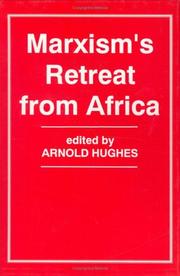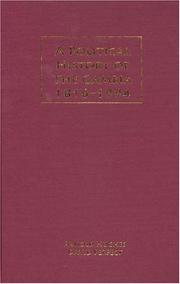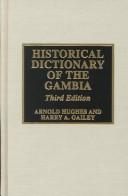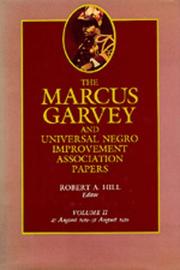| Listing 1 - 8 of 8 |
Sort by
|

ISBN: 0714645028 Year: 1992 Publisher: London Cass
Abstract | Keywords | Export | Availability | Bookmark
 Loading...
Loading...Choose an application
- Reference Manager
- EndNote
- RefWorks (Direct export to RefWorks)
812 Ideologie --- 815 Geschiedenis --- 841 Politiek Bestel --- 841.1 Democratisering --- 841.3 Politieke bewegingen --- 841.5 Bestuur en beleid --- 881 Afrika --- 881.1 Oost-Afrika --- 881.2 Centraal-Afrika --- 881.4 Zuidelijk Afrika --- 881.5 West-Afrika --- 884.1 Oost-Europa --- Socialism --- Marxism --- Social democracy --- Socialist movements --- Collectivism --- Anarchism --- Communism --- Critical theory --- Africa, Sub-Saharan --- Africa, Black --- Africa, Subsaharan --- Africa, Tropical --- Africa South of the Sahara --- Black Africa --- Sub-Sahara Africa --- Sub-Saharan Africa --- Subsahara Africa --- Subsaharan Africa --- Tropical Africa --- Politics and government
Book
Year: 1973 Publisher: Birmingham University
Abstract | Keywords | Export | Availability | Bookmark
 Loading...
Loading...Choose an application
- Reference Manager
- EndNote
- RefWorks (Direct export to RefWorks)

ISBN: 9781580461269 1580461263 1282080601 9786612080609 1580466826 1580462308 Year: 2006 Publisher: Rochester, NY : University of Rochester Press,
Abstract | Keywords | Export | Availability | Bookmark
 Loading...
Loading...Choose an application
- Reference Manager
- EndNote
- RefWorks (Direct export to RefWorks)
A Political History of the Gambia: 1816-1994 is the first complete account of the political history of the former British West African dependency to be written. It makes use of much hitherto unconsulted or unavailable British and Gambian official and private documentary sources, as well as interviews with many Gambian politicians and former British colonial officials.
The first part of the book charts the origins and characteristics of modern politics in colonial Bathurst (Banjul) and its expansion into the Gambian interior (Protectorate) in the two decades after World War II. By independence in 1965, older urban-based parties in the capital had been defeated by a new, rural-based political organisation, the People's Progressive Party (PPP).
The second part of the book analyzes the means by which the PPP, under President Sir Dawda Jawara, succeeded in defeating both existing and new rival political parties and an attempted coup in 1981. The book closes with an explanation of the demise of the PPP at the hands of an army coup in 1994.
The book not only establishes those distinctive aspects of Gambian political history, but also relates these to the wider regional and African context, during the colonial and independence periods.
Emeritus Professor Arnold Hughes was educated at the University of Wales, Aberystwyth, and Ibadan University, Nigeria. Between 1966 and 2001 he taught at the Centre of West African Studies, the University of Birmingham, becoming its Director and Professor of African Politics. He has researched and published widely on various aspects of African politics and political history and, since, 1972, developed a special interest in the political history of the Gambia. He has paid some twenty-five research visits to the Gambia and published two books, The Gambia: Studies in Society and Politics (1991) and Historical Dictionary of the Gambia (with H. A. Gailey) (1999); and over thirty articles and book chapters on Gambian politics.
#SBIB:96G --- #SBIB:328H419 --- Geschiedenis van Afrika --- Instellingen en beleid: andere Afrikaanse landen --- Gambia --- Politics and government. --- GambiaPolitics and government. --- POLITICAL SCIENCE / Colonialism & Post-Colonialism. --- British rule. --- Gambia. --- Independence. --- Jawara government. --- Political history.
Book
Abstract | Keywords | Export | Availability | Bookmark
 Loading...
Loading...Choose an application
- Reference Manager
- EndNote
- RefWorks (Direct export to RefWorks)

ISBN: 9781580466820 9781580462303 Year: 2006 Publisher: Rochester, NY University of Rochester Press
Abstract | Keywords | Export | Availability | Bookmark
 Loading...
Loading...Choose an application
- Reference Manager
- EndNote
- RefWorks (Direct export to RefWorks)

ISBN: 0810836602 Year: 1999 Volume: 79 Publisher: Lanham ; London Scarecrow Press
Abstract | Keywords | Export | Availability | Bookmark
 Loading...
Loading...Choose an application
- Reference Manager
- EndNote
- RefWorks (Direct export to RefWorks)
908 <665.1> --- Heemkunde. Area studies--Gambia --- Gambia --- Gambie --- Colony of the Gambia --- Republic of the Gambia --- Respublika Gambii︠a︡ --- Gambii︠a︡ --- Gambia, The --- The Gambia --- ガンビア --- Ganbia --- History --- Dictionaries --- 冈比亚 --- Gangbiya
Book
ISBN: 9780810858251 Year: 2008 Volume: 109 Publisher: Lanham ; Toronto ; Plymouth Scarecrow Press
Abstract | Keywords | Export | Availability | Bookmark
 Loading...
Loading...Choose an application
- Reference Manager
- EndNote
- RefWorks (Direct export to RefWorks)


ISBN: 0520342305 0520916824 0585366403 9780520916821 9780585366401 9780520050914 0520050916 9780822346906 0822346907 9780822357377 0822357372 9780822361169 0822361167 9780822392729 0822392720 0520044568 9780520044562 0520202112 9780520202115 0520247329 9780520247321 0520062140 9780520062146 0520072081 9780520072084 1283265834 9786613265838 9780520342309 0822376180 1322151903 0822374285 Year: 1995 Publisher: Berkeley, CA
Abstract | Keywords | Export | Availability | Bookmark
 Loading...
Loading...Choose an application
- Reference Manager
- EndNote
- RefWorks (Direct export to RefWorks)
"Africa for the Africans" was the name given in Africa to the extraordinary black social protest movement led by Jamaican Marcus Mosiah Garvey (1887-1940). Volumes I-VII of the Marcus Garvey and Universal Negro Improvement Association Papers chronicled the Garvey movement that flourished in the United States during the 1920s. Now, the long-awaited African volumes of this edition (Volumes VIII and IX and a forthcoming Volume X) demonstrate clearly the central role Africans played in the development of the Garvey phenomenon. The African volumes provide the first authoritative account of how Africans transformed Garveyism from an external stimulus into an African social movement. They also represent the most extensive collection of documents ever gathered on the early African nationalism of the inter-war period. Here is a detailed chronicle of the spread of Garvey's call for African redemption throughout Africa and the repressive colonial responses it engendered. Volume VIII begins in 1917 with the little-known story of the Pan-African commercial schemes that preceded Garveyism and charts the early African reactions to the UNIA. Volume IX continues the story, documenting the establishment of UNIA chapters throughout Africa and presenting new evidence linking Garveyism and nascent Namibian nationalism.
African Americans --- Black power --- Manuscripts, American. --- Afro-Americans --- Black Americans --- Colored people (United States) --- Negroes --- Africans --- Ethnology --- Blacks --- American manuscripts --- Power, Black --- Black nationalism --- Correspondence. --- History --- Sources. --- Civil rights --- Race identity --- Garvey, Marcus, --- Garvey, Marcus Mosiah, --- Universal Negro Improvement Association --- UNIA --- African diaspora --- Black diaspora --- Diaspora, African --- Human geography --- Migrations --- Caribbean Area --- Caribbean Free Trade Association countries --- Caribbean Region --- Caribbean Sea Region --- West Indies Region --- Emigration and immigration --- Black people --- Black persons --- Transatlantic slave trade
| Listing 1 - 8 of 8 |
Sort by
|

 Search
Search Feedback
Feedback About UniCat
About UniCat  Help
Help News
News